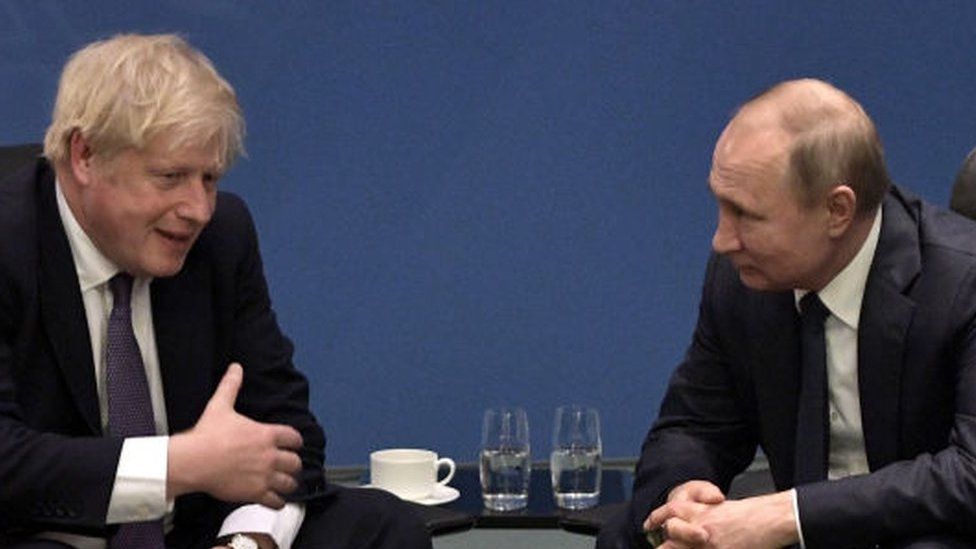Ukraine: Boris Johnson to call Vladimir Putin and visit region
- Published

Boris Johnson will telephone Russian President Vladimir Putin and visit eastern Europe in the coming days as the UK steps up its diplomatic efforts to resolve the Ukraine border crisis.
No 10 said the PM would repeat the need for Russia to "engage diplomatically" when he spoke to Mr Putin this week.
He would "reiterate the need for Russia to step back", No 10 added.
Mr Johnson has said the UK could deploy troops to protect Nato allies if Russia invaded Ukraine.
However, Ukraine is not part of Nato and Russia wants the West to promise it will never join the military alliance, seeing it as a direct threat to its security.
Nato's 30 members include the US, UK, and several former Soviet republics, some of which border Russia. Members agree to come to another's aid in the event of an armed attack.
Russia has placed about 100,000 troops, tanks, artillery and missiles near Ukraine's border, but denies it plans to invade the former Soviet republic, which borders both Russia and the EU.
As well as Mr Johnson's visit to the region, Foreign Secretary Liz Truss will visit Moscow in the next two weeks, the Russian Embassy in the UK said.
Mr Johnson has asked military and security chiefs to give him more options to mitigate against what Downing Street has called "growing Russian aggression".
This weekend, the prime minister is considering those options - including the deployment of more British troops to Nato countries in the region.
On Monday, the Foreign Office is expected to announce to Parliament a toughening of its sanctions regime, which would enable the UK to target Russian interests.
Last week, Mr Johnson joined a phone call with US President Joe Biden, European leaders and Nato Secretary General Jens Stoltenberg.
During the call, the leaders agreed "that diplomatic talks with Russia remained the first priority", Downing Street said.
A Downing Street spokeswoman said: "The prime minister is determined to accelerate diplomatic efforts and ramp up deterrence to avoid bloodshed in Europe."
Meanwhile, Ukraine's President Volodymyr Zelensky has urged the West not to create panic - saying that warnings of an imminent invasion were threatening the nation's economy.
Russia-Ukraine tensions: The basics
Watch: Understand the Ukraine crisis with Ros Atkins in less than six minutes
Last week, Defence Secretary Ben Wallace travelled to Europe to build momentum for sanctions against Russia and support for Ukraine.
Mr Wallace visited the Hague, Berlin and Belgium to push for further action from European allies. He is shortly set to travel to Moscow for talks with Russia's Defence Minister, Sergei Shoigu.
The defence secretary told the BBC there was still "a chance" that a Russian invasion could be halted, but added: "I'm not optimistic."
Mr Putin has long argued the US broke a guarantee it made in 1990 that Nato would not expand further east, though interpretations differ over exactly what was promised.
Since then, several central and eastern European countries, which used to be part of the Soviet Union or its sphere of influence, have joined Nato. Four of them - Poland, Lithuania, Latvia and Estonia - have borders with Russia.
Russia argues that this expansion, and the presence of Nato troops and military equipment near its borders, threatens Russia's security.
Last month, Russia made three demands of Nato: Ukraine should be barred from joining; it should end military activity in eastern Europe; and should not deploy missiles in countries near or bordering Russia.
The US and Nato responded by saying Ukraine had the right to choose its own allies, but offered Russia talks on missile placements and other issues.
If Russia were to invade Ukraine, it would not be the first time.
Russia annexed Ukraine's southern Crimea peninsula in 2014. It is also backing rebels who seized large swathes of the eastern Donbas region soon afterwards, and some 14,000 people have died in fighting there.
- HOW MUCH DO WE REALLY KNOW ABOUT THE PEOPLE WE FOLLOW? The dark side of our obsession with social media
- ONE OF THE BIGGEST MURDER INVESTIGATIONS IN MET POLICE HISTORY: The Nilsen Files on BBC iPlayer
Related Topics
- Published28 January 2022
- Published26 January 2022
- Published25 January 2022